- Home
- Barry Unsworth
Sacred Hunger Page 54
Sacred Hunger Read online
Page 54
Sarah’s face came too, stately as Miranda, calm with love, then with tears on the cheeks and some ultimate accusation in the eyes. His wife’s grotesque masks floated before him and his mother’s face of recovered health, which he had never been able to forgive. Last, eclipsing the others, the laughing face of the youth who had lifted him away…
Yes, the days were numbered now for cousin Matthew.
You will hang by the neck, as my father did, he promised that laughing face. Lying there in the dark he could feel the noose tightening round his cousin’s throat, feel it so surely that it was like a constriction of his own breathing.
PART NINE
46.
The passage of Erasmus’s ship up the coast towards Still Augustine had been observed by Hughes the climber, who also noticed the unusual length of time she dallied at anchor. He was high in the branches of a gum-resin tree in a jungle cluster surrounding a freshwater pool where white-tail deer came to drink—he had been waiting for the deer since early morning.
He saw the ship in the distance and noted by old habit the set of her sails: two square topsails, fore and aft rig—she was a schooner.
He had grown accustomed over the years to the fleeting sight of sails on the horizon, high-bowed Spanish merchantmen bound for Cuba, an occasional frigate patrolling off the coast, the long, lateen-rigged fishing canoes of the Indians. They showed their shapes to his indifferent gaze, drew away and dissolved like a doubtful memory.
Hughes was fifty-four now and had long ceased wanting to be anywhere else. The purposes of his fellows did not much occupy his speculation. He had noticed that this ship stayed longer than she needed for taking water on. But he soon stopped thinking about her altogether and fell to watching a woodpecker with bright yellow wing-feathers feeding in the branches of a tree some twenty yards away. He watched with close interest the movements of its feet and beak as it swung to get at the clusters of small red berries. Any life before his eyes that was not human could absorb his attention for hours. Inviolate here, high in the branches, his rope ladder drawn up and coiled on the lashed driftwood of the platform, he felt the solitude like an accustomed drug in his veins.
Community life had come too late for Hughes —too late to soften much the savage misanthropy of his nature; but he could escape now, into these empty places, and the impulse of violence had quietened in him. He ranged far and wide, from the pinewood ridges near the shore to the swamps and jungle islands behind them and the great sea of saw grass that stretched far inland from the settlement. He cultivated no ground, living on what he could kill or gather, bringing in skins sometimes to trade for food, going to Lamba, his woman, at irregular intervals.
This last habit had caused trouble in early days, made worse by his demand for Lamba’s immediate and total attention whenever he arrived. It violated established rules of sexual behaviour, which were founded on the woman’s consent, and reflected on the dignity of the man he shared Lamba with, a negro known as Mando Tammy. The three had come to fighting over it, Tammy receiving a knife-gash in his arm which had to be stitched by Matthew Paris, and Hughes lucky to escape permanent damage to an eye from Lamba’s nails. But habit is a skin that can grow over any shape and they had reached a kind of understanding over the years. Hughes could not be brought to any concept of the mutal rights involved in sharing; but he was granted some latitude as a special case. It was never forgotten that he had once, by his vigilance, saved the settlement.
He watched the woodpecker until it disappeared among the lower foliage and then, with the same attention, a honey-coloured bee at the flowers of a smooth-barked tree which grew almost as tall as his own, ending some feet below his platform. He followed the movements of the bee as it clambered among the drooping white spikes of blossom, observing how the insect vibrated its body each time it entered one of the flowers. His mind moved slowly over possible explanation. Could the bee do this to help the flower spread its pollen? From time to time he glanced across the short space of clearing towards the black water below him. In this dry season, when the levels sank below the roots of the saw-grass, the deer came more often to these pools in the jungle islands. He knew they came to this one: he had see their traces in the soft earth at the edge and the nibbled-off tops of the spider-lilies.
The dark water mirrored with absolute fidelity the bushy cabbage palms standing nearby and the spikes of air plants that grew on them and the pale drapes of moss that hung over the surface. No faintest tremor marred these reflections for the moment, all was glassy calm, but Hughes knew that there was always danger in the vicinity of these jungle pools. Not only deer came to drink here: he had seen snake tracks and the pad marks of a panther at the edges.
It was a good place to wait. At forty feet above ground he was not much troubled by mosquitoes.
There was small need for camouflage, deer almost never looked upward; and at that height his smell would be undetectable to them. His bow and cane arrows lay on the platform beside him. The bow was as tall as he was.
He had cut and seasoned the wood himself and strung it with deer-gut. He had to use his full strength to draw it. Most men in the settlement had adopted the Indian habit of pointing their arrows with sharpened fish-bone, but Hughes preferred flint arrowheads, lengthening the shaft to balance the extra weight. He had become expert with the weapon. At this range, if he caught the deer drinking, he could break its neck with a single shot. An instant kill was better, there was more respect in it; and the meat was sweeter when the beast had died without fear.
Sooner or later, perhaps in the early evening, they would come stepping through the trees. Meanwhile he was content to wait. More than content: there was in this exercise of patience the nearest thing to happiness that Hughes had ever known. The feeling lay far below his capacity for words, but it was as if the casual elements of his surroundings, the foliage and the dark water and the bright air and the life of small creatures around him, were freed by his waiting to be truly themselves.
In early afternoon it rained a little. There had been a succession of similar days. The mornings began warm and clear, then towards midday clouds gathered in the east and drew. rapidly across the sky. Out to sea the shafts of rain squalls were visible, shaped like inverted fans and imbued with a smoky radiance. These spread to the land and there were showers of rain, sometimes heavy. By mid-afternoon the skies were clear again, without visible stain, and the sun shone as warmly as ever. At this season clouds formed and dissolved casually. The rain was like a brief smudge of breath on a clear window, bringing no consequence, leaving no trace.
Hughes leaned back against the trunk, drew up his legs and sat still under the rain. Afterwards a faint steam rose from the wet leaves. Before they were properly dry he saw a hunting spider lower itself on an invisible thread and come to rest directly before his face. This type of spider he had seen before: they made no web, but hunted their prey through the foliage and among the litter in the clefts of the branches. He leaned slowly and carefully forward and looked at the creature closely. Its eyes were saucer-shaped, unmoving. When he looked into them, he saw there a pulsing, flashing light. It was as if a shutter were being drawn rapidly back and forth over some brightness at the back of the eye…
Another person who saw the ship pass was Temka Tongman. He was paddling out to his fishnets in the reedy verges of an inlet a mile or so down the coast from the settlement. He paid little attention to the passing vessel. His mind was on the Palaver, due to be held in some days’ time, at which he had agreed to be the speaker for Bulum Iboti, who was accused of practising witchcraft.
Tongman’s abilities as a speaker were widely recognized—he owed his name to them. He was thinking now of the fact that Iboti, a notoriously unlucky man, had agreed to pay him in labour, instead of the acorn flour he had offered at first.
Tongman had no need for acorn flour, but he wanted ground cleared for planting pumpkins and sweet potatoes, both of which grew well in the rich soil at the edges of the freshwater la
goons.
Iboti had agreed to clear fifty paces by ten of roots and vines if he won the case. Naturally, there would be no fee if he lost. Two witnesses had seen them strike hands together…
“Dat ten day work, Iboti,” he said aloud.
“Where you from?”’ Tongman liked the sound of his own voice and in these lonely places he often talked to himself. After twelve years pidgin came more naturally to him than the Temne he had spoken as a child. He had been surprised when his client agreed to complete the work, rather than simply promising a fixed number of days. Iboti could have got away with half of the time. He was not merely unlucky, he was foolish too. Perhaps it was the same thing.
Tongman was a dealer by instinct, a settled, sedentary man, wily of speech. As he paddled out through the narrow channels in the mangroves into the ruffled, gleaming expanse of open water, he wove a golden future for himself. He would exchange the surplus of his vegetables for the salt and flint that more adventurous spirits like Cavana and Tiamoko, working in partnership, brought down from the north. Salt and flint were goods that could be kept indefinitely, until the time came when shortage would increase demand.
His net broke the water. A large, green-mottled lizard fish threshed in the depths of it, its long jaws snapping to show the rows of teeth.
“Dis fish palava too much,” Tongman said. “Look at me bad yai. I got de answer for you, my fren”.” He took up a short club from the floor of the canoe and gave the lizard fish a blow on the head with it, stilling its movements instantly. ‘Where dat bad yai now?”’
He was pleased to find the silver-blue fish with the big fleshy lump on its forehead, which he knew from the rivers of home. “You come a long way. Got a big head, live a long time, finish now. Only one time fish ken die, same as man.”
He felt confident he could win the case. He had made his own enquiries and had a surprise witness, whom he had sworn to secrecy. All the same, there were aspects of the business that worried him, the main one being the identity of Iboti’s accuser. Shantee Hambo was a fellow tribesman of Danka, one of the men with whom Tongman traded, and more importantly of Kireku, whom it was better to have for a friend than an enemy. These three were all the Shantee that had survived, but they formed a powerful group. And they had begun to claim their male children, which was contrary both to rule and custom…
The net was in now. Apart from the big parrot-fish, it had not been a good catch. But there were two bait fish, which he knew from the strong, brassy lustre of their colouring. They were not good to eat, but they were full of oil and could be chopped and scattered to attract the the big, black and silver food-fish that lay in the deep water of the creek mouths. This he remembered doing in another life, on a wider, swifter river.
Tongman had been a boy of fourteen when he was caught by a slaving party and sold aboard ship. His memories of childhood lay beyond the misery and terror of the voyage. They were thus in a charmed place, not altogether believed in but vivid and piercing when they came, and curiously arbitrary too. He had remembered scattering bait on the bright, flecked surface of the Roketa River, rocking in a dugout canoe not much different from this one, his father in the stern with a long spear. The memory was changeless: there was always the bright, eddying water, the crash of waves over the bar at the river mouth, the conical roofs of huts along the banks. And there were big white birds with forked tails that flew endlessly over the water. He could remember their quick shadows over the surface but he could not remember hearing any sounds from these birds, nor ever seeing them settle. In his memory they dipped and wheeled for ever in total silence…
Past and present were also interfused in an argument taking place on the outskirts of the settlement at more or less the same time, between Billy Blair and the negro named Inchebe.
“Oh, Billee, Billee, I so sorry for you, I ready for cry,” Inchebe said, shaking his head from side to side and blinking sorrowfully. “You don” know de shit of de fire from de burnin’ of de fire, dat you great trouble, man.” He was small and coal black, with a mobile, slightly twisted face, very quick and delicate in all his movements.
Blair’s frayed and battered palm-leaf hat dipped over his brows and the lower part of his face was hidden by a fair, curly beard. But his blue eyes were wrathful as ever, wide now with the furious protest with which he greeted all the manifold contradictions and failures of logic in the world. ‘allyou talkin” bigbig rabbish, Cheeby my son,” he said.
‘allyou altagedder tellin” me you got stone make rain? You want me b’lieve you knock bleddy stone tagedder make rain? Dat all my arse an’
Betty Martin.”
One of Inchebe’s great strengths in argument—and it was one peculiarly infuriating to Billy—was that he never sought to persuade. He radiated always a placid, unassertive confidence of being in the right.
‘What you b’lieve you business,” he said. “I tellin” trut.”
Both men were somewhat out of temper. They had spent most of the day trying to shoot turkey in the swamps without any success, stumbling and slipping in pursuit of that most wily and sagacious of birds, making gobbling noises in the vain hope of drawing one to them. All they had got were two small squirrels, hardly enough for a stew. In such situations they each tended to lay the blame on the other. They were in any case on terms of exasperated familiarity owing to the fact that they shared the same woman.
Sallian Kivee had grown very fat and had never been a beauty, but she was a good-tempered woman, very faithful by nature and an excellent cook. She had been content for ten years now with these two.
‘I hear you talkin” bigmowf Dinka Meri,”
Billy said, ‘say her you got rainstone, make yourself out big rainman.”
Inchebe returned no answer to this, merely gazing around him with his small, bright eyes. Billy too was silent for a while, as if baffled. Of late years a habit of suspended consciousness had grown in him.
At any time, when he was alone or with others or even, as now, in the midst of argument, there would come a certain kind of hush over things, everything before him would seem fixed somehow, arrested. Accompanying this was a kind of perplexity at the strangeness, the ultimate illogicality, of his being where he was. He felt this now as he looked away towards the first huts of the settlement. Only the sloping thatches of the roofs were visible from here; the rest was concealed behind the stockade of palm logs that encircled the whole area. He and Inchebe were standing outside this, lower down, on a track that led through thin forest. Some children were playing together up against the stockade and two women stood talking nearby. Beyond them, in the distance, he saw the hulking form of Libby go past, carrying what looked like fencing for a fish trap. Probably on some errand for Kireku, he thought with faint contempt. “Dinka never go b’lieve you,” he said. “She not born yestaday, she sabee you jus” tryin’ git you leg over.”
Inchebe was unmoved. ‘I not born yestaday, neever. I sabee you tryin” git you leg over.”
Dinka was young, twenty-two or three, it was computed, tall and graceful, scornful of smile but melting of eye. She was visited by a man of the Bulum, middle-aged and taciturn, known to everyone by the single name of Amos. But her regular man had failed to return from a fishing trip and was now presumed drowned.
‘allyou jaloos, Billee,” Inchebe said.
“Dat what it is.”
Billy feigned laughter. The floppy brim of his hat nodded up and down. “Me jaloos? Dat a good ‘un. Ho, ho, look de big ‘portant rainman of Africa.”
“Prentiss man.”
“What you say?”’
“I prentiss rainman.”
‘Aha!” Billy’s eyes shone with triumph.
“Dat a different song,” he said. “Dat not what you tell Dinka.”
At this moment Sullivan came up the track and joined them. He was carrying a palm-fibre basket three-quarters full of freshwater mussels.
“Well, me brave lads,” he said. “Will you look at this now?”’ He took up a
handful of mussels and let them slide off his palm into the basket, watching the clattering blue shells with eyes that were hallucinated-looking in the deep tan of his face. Sullivan was a great man for mussels and clams and knew all the best places. Gathering them he was sometimes taken back to his childhood in Galway, foraging for shellfish in the salt recesses of this same ocean.
He was naked except for his deerskin moccasins and a breechclout of braided palm leaves and he smelled of the fish oil he had rubbed on himself against mosquitoes. His black hair fell almost to his shoulders and was held off his face by a band of fibre tied across the forehead. “You make swap?”’ he said, reverting to pidgin at the prospect of trade.
“You make me good swap five pint measure mussel? What you got?”’
Neither Billy nor Inchebe said anything.
Sullivan regarded the two small, limp squirrels hanging head downwards from Billy’s rope belt. “Dat all?”’
Billy looked away from the mussels with assumed indifference.
“De time come for trut,” he said doggedly to Inchebe. “You tell Dinka you got rainstone, you show me dem rainstone. Where dey?”’
Inchebe turned to Sullivan, twisting his mouth and widening his small expressive eyes. “You hear dis man? He tink rainman carry cargo rainstone aboard all de time.” He turned a pitying glance back to Billy. “Dey kept secret place, close water,” he said. “No tell where.
Anyone know anyting bout rainstone know dat. Why you care soso much what ‘pinion Dinka have? Dat no secret, I tell you why, you want get in Dinka bed, get you leg over.”
“For the love of God,” Sullivan said. His face had assumed an expression of astonishment.
His green eyes glanced after a lost vision of human reason and decency. “You feller sniffin” after dat no-good Dinka when you got a soso jool at home? Yeh, yeh, dat right, I talkin’ bout you Sallian. She cook good too much, she fuck much you want, she never naggy. What man do when he got woman like dat? I tell you what, he treasure dat woman, he put de grapple on dat woman, he climb aboard an’ stay aboard.”

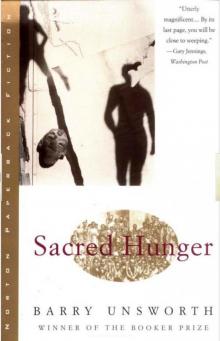 Sacred Hunger
Sacred Hunger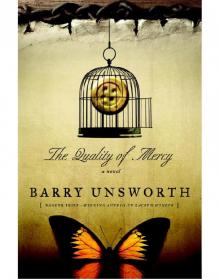 The Quality of Mercy: A Novel
The Quality of Mercy: A Novel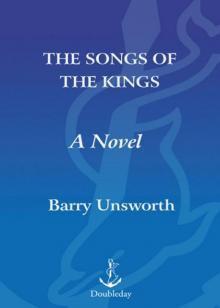 The Songs of the Kings: A Novel
The Songs of the Kings: A Novel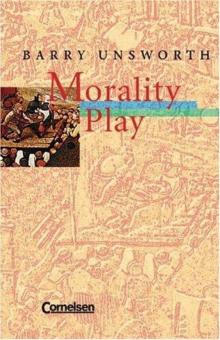 Morality Play. Mit Materialien. (Lernmaterialien)
Morality Play. Mit Materialien. (Lernmaterialien)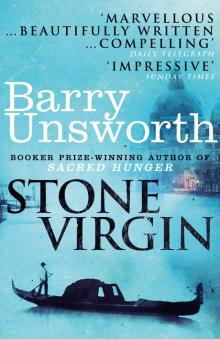 Stone Virgin
Stone Virgin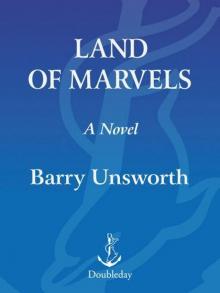 Land of Marvels
Land of Marvels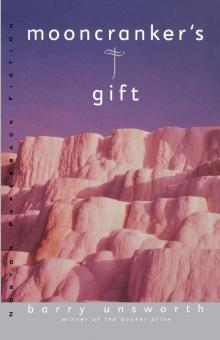 Mooncranker's Gift
Mooncranker's Gift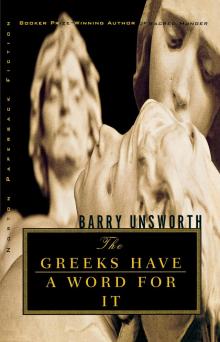 The Greeks Have a Word for It
The Greeks Have a Word for It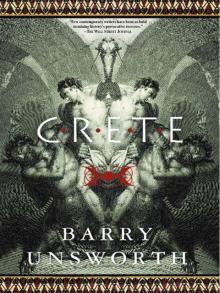 Crete
Crete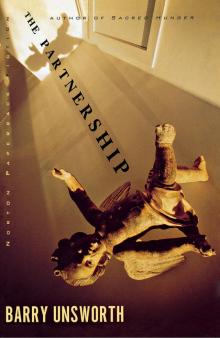 The Partnership
The Partnership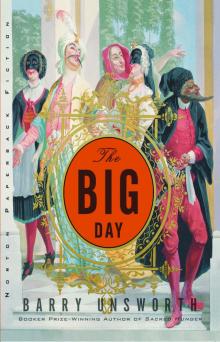 The Big Day
The Big Day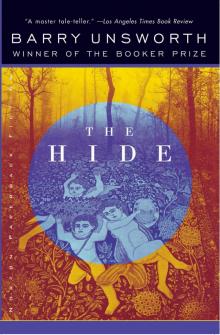 The Hide
The Hide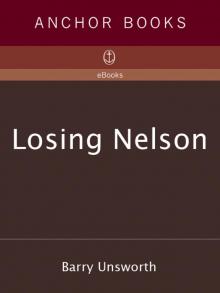 Losing Nelson
Losing Nelson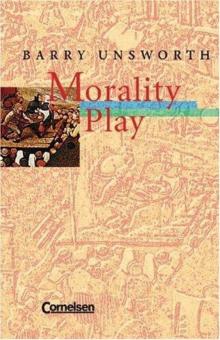 Morality Play
Morality Play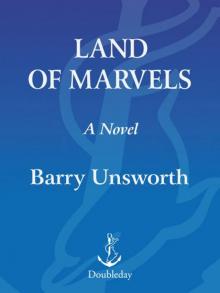 Land of Marvels: A Novel
Land of Marvels: A Novel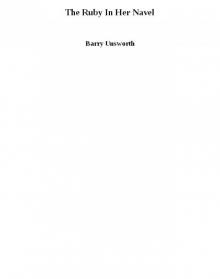 The Ruby In Her Navel
The Ruby In Her Navel